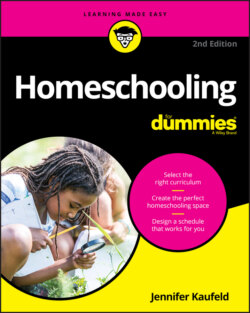Читать книгу Homeschooling For Dummies - Jennifer Kaufeld - Страница 88
Firing Up the Bunson Burner
ОглавлениеScience is everywhere. Especially when you’re four feet tall. Gazing at the clouds counts as science, particularly if some helpful adult (that would be you) identifies them by type for your child. Watching a favorite plant grow and flower is science. It’s also science when you forget to water it and the plant dies — a way of redeeming all those plants I kill.
Although you can purchase elementary science books for your child as she passes through each grade level, you may want to concentrate on the real world and its offerings for the first six years or so.
Go outside and explore nature.
Conduct experiments with household items. I don’t know how many times we’ve done the old baking soda-and-vinegar-volcano project, but it’s still a family favorite.
Create a kite from a sheet of printer paper and fly it. You learn much about wind this way.
Find a plastic can or honest-to-goodness rain gauge and set it outside to measure the rainfall. If you remember to measure and then empty it after each good rain, you get a good idea of the precipitation in your area.
Hang an all-weather thermometer outside and graph each day’s temperature in Fahrenheit and Celsius.
Try raising an ant farm, brine shrimp, or mice. This, of course, depends much on your general pet tolerance — your children will survive if they only see ants outdoors.
Your library provides a wealth of books in the sciences. If you need a few fresh ideas, wander up and down the juvenile science section of your local library and pull books at random. (Remember to put them back when you’re finished or your librarians will dislike me intensely.) You should find science biographies and books chock full of experiments as well as books about animals, plants, rocks, and so on.
Before the last few years, finding a solid, evidence-based homeschool science book was like retrieving Excalibur from your local lake. Unless you knew how to order science books from the school publishers (and had the extra money to do so), the local library was your fallback science textbook. While it’s still a good source, a few publishers have risen from the foam to help elementary homeschoolers learn science. (See the sidebar to find out why that’s important.) Here are some options to fill your science void.
Building Foundations of Scientific Understanding: This curriculum, fondly referred to as BFSU by the homeschoolers who love it, develops an impressive understanding of science over three volumes. You use each volume for three years and the material builds on itself, so you will probably start with the first book regardless of your students’ ages. This course requires some parental prep and reading time, but it uses few materials you don’t already have around the house (the first lesson in Volume 1 suggests the family junk drawer). Each lesson includes introductory information, experiments and activities, explanations, additional reading options from the library, and how you know if your student gets the concept. These books cover K through grade 8. Order from
www.bfsucommunity.comorwww.outskirtspress.com.REAL Science Odyssey: (
www.pandiapress.com/real-science-odyssey/) You can begin with REAL Science Odyssey in kindergarten and use it all the way through eighth grade. Each book covers a different topic, including earth science, chemistry, biology, and physics, and each book works for a range of grade levels. My personal favorite: They offer two astronomy courses for grades 1 through 4 and grades 6 through 10.The Science of Climate Change: A Hands-On Course: (
seculareclecticacademic.com) If climate change concerns you or your students, this book helps you tackle the concept head-on. Written in understandable language, the book introduces the issues and then leads students through 18 experiments and activities to show them why the science is valid. For grades 4 through 10, if the high schoolers are new to the subject.
If your child loves science but doesn’t yet read at the level she comprehends, you can always read the science books to her. In this manner, she satisfies her thirst for knowledge and skips the frustration of stumbling over the words that she’s not ready to read on her own.
